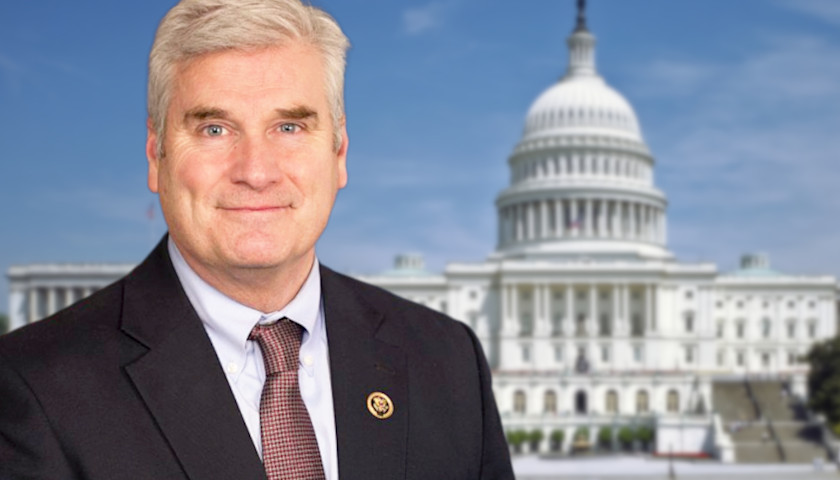by Robert Romano
In 2011, before serving for the House of Representatives’ 6th Congressional District, U.S. Rep. Tom Emmer (R-MN-06), current chairman of the National Republican Congressional Committee, was a national spokesperson for the National Popular Vote initiative, legislation that forms a state-to-state compact with other states agreeing to pledge their state’s electors in the Electoral College to the winner of the national popular vote once participating states reach 270 electoral votes.
This would effectively eliminate the current winner-take-all system in the Electoral College, which has been in place since the election of 1824, whereby whoever wins the popular vote in a state wins the state’s electoral votes.
Democrats have won the popular vote in seven out of the last eight presidential elections: 1992, 1996, 2000, 2008, 2012, 2016 and 2020, by an average of 5.5 million votes. The worst years for Republicans in the national popular vote were 2008 when the margin of Barack Obama’s victory was 9.5 million, 1996 when the margin was 8.2 million in favor of Bill Clinton and 2020 when it was 7 million in favor of Joe Biden. The only exception recently that a Republican won the national popular vote in was George W. Bush in 2004.
Clearly, the Electoral College right now may be the one thing keeping our two-party system intact, making the National Popular Vote Interstate Compact an almost certain recipe for Democratic one-party rule.
And the person leading the Republican charge to reclaim the House of Representatives in the 2022 midterms apparently thinks that’s okay.
Remarkably, in an interview with Tony May at the time in 2011 when Emmer was still a spokesman for the initiative, Emmer stated that national popular vote would give states more control over the outcome of elections: “Conservatives who believe in federalism, conservatives who believe in states’ rights, should absolutely be supportive of national popular vote, because of the system we have right now, it takes your control away. You take your control back by looking at how should you award your electors.”
Interview with Tom Emmer (R-MN), Spokesperson for National Popular Vote from Triad Strategies on Vimeo.
Apparently, one way for states, in Emmer’s view, to assert “control” would be by awarding their states’ electors to their neighboring states’ preference for presidential candidate, even if their own constituents voted for the other candidate.
Emmer even claimed in the interview he still supported the Electoral College: “Frankly, from my perspective, the Constitution and the way it’s been set up with the Electoral College, that is appropriate, that independent way of choosing the President, I believe in. But, I don’t believe in eliminating the Electoral College and this doesn’t change it, this does nothing more than give the state back its right, remind the states that individually, you have the right to ward those electors any way you see fit. It’s not working under the current system.”
Now, it is true that states can individually decide how they want their electors allocated. But that is already exactly what they do now. Every state except Maine and Nebraska (which do so proportionally based on Congressional District) allocate their electors on a statewide, winner-take-all basis via state laws.
In fact, states have considered the National Popular Vote Interstate Compact initiative for years, in effect “looking at how should you award your electors,” as Emmer said, and so far a majority of states have said no thanks. Saying no asserts control, too.
In fact, only 15 states plus the District of Columbia have adopted the interstate compact so far are Maryland, New Jersey, Illinois, Hawaii, Washington, Massachusetts, D.C., Vermont, California, Rhode Island, New York, Connecticut, Colorado, Delaware, New Mexico and Oregon — all states that voted for Joe Biden in 2020 and Barack Obama in 2008 and 2012.
Not a single Republican, red state has adopted what would amount to a political suicide pact. Although, this year, there are bills in state legislatures offered by Democrats in the following states that are attempting to join the compact: Minnesota, Utah, Arizona, Texas, Oklahoma, Kansas, Missouri, Iowa, West Virginia, South Carolina, Georgia and Florida.
Of those, only Emmer’s home state of Minnesota, where Republicans hold a narrow one-seat majority in the State Senate, might be the most vulnerable to joining the compact.
On March 12, I reached out Representative Emmer’s office to clarify his position on this issue. I’m still waiting on a response. After all, 2011 was a long time ago and sometimes people change their minds. In 2014, when Emmer ran for Congress, this issue was brought up by Emmer’s opponent in the GOP primary, Anoka County Commissioner Rhonda Sivarajah, but, according to the SC Times, “Emmer’s campaign didn’t immediately respond to a request for comment on Sivarajah’s release.”
Does Emmer still support the National Popular Vote Interstate Compact?
Assuming Emmer has not changed his position, Republican voters would probably want to know that the leader of the GOP’s efforts to reclaim the House of Representatives in 2022 may not really want Republicans to win elections, given his past support of a proposal that would destroy the nation’s competitive two-party system by virtually guaranteeing Republicans never win the White House for another generation — if ever again.
– – –
Robert Romano is the Vice President of Public Policy at Americans for Limited Government.








